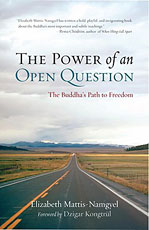"But life is not something that happens to us. We can't separate ourselves from the constant stream of experience we call our life. We are not victims of our life, and we are not unworthy of our life either. Life is not too beautiful or divine for us. It is not too big or painful or frightening or even too complicated for us, although at times it may seem that way. Our challenge, as human beings, is to make ourselves big enough to accommodate all of it.
Embracing Our Humanness
" 'Accommodating all of it' as a practice means embracing our humanness in all its glory and confusion. It means accepting the beauty, ugliness, joy, and pain of the world — our world — and all its mystery, ambiguity, and contradiction, too. How do we live a life we can't hold on to? How do we enjoy a piece of chocolate cake when a child in Africa has cholera? How do we reconcile 'me' with 'enlightenment'? Who can answer these kinds of questions? No one can. But we can embrace their mystery.
"Accommodating all of it is a heart practice, because we are inviting life rather than rejecting it. This practice expresses the fundamental principle of nonviolence, because we can't hold others responsible for our happiness and pain. We can't point a finger at the government and say, 'That's why my life sucks.' We can't objectify things in this way when we practice. But we can take on our life knowing that each moment of it arises in connection to a grand and unfathomable landscape, of which we are an integral part. We are naturally big — naturally infinite — like everything else.
"As we begin the practice of accommodating all of it, we may feel intimidated by the wild and unruly character of our thoughts and emotions. But as we learn to habituate ourselves to openness rather than objectifying things, we come to know the nature of thoughts and emotions. We can't truly find these things we usually shrink away from or react to. They move and change and arise in dependence upon other things.
"Knowing this loosens up the whole atmosphere of the mind. We may recall that when we first started practicing meditation, we could only relax with about 20 percent of our experience, but as we practiced we could relax with 30 percent . . . then 40 percent . . . or more. As we practice we may even develop a passion to understand experiences that have always frightened us — experiences we've tried to avoid. Practice engenders this kind of boldness.
"The practice of accommodating all of it includes all the things we like and don't like; this allows us the freedom to be a full human being without the agitation that comes from trying to sort, manage, and label our experience. If we do this practice for a while, we start to see that even suffering is full of possibility."
